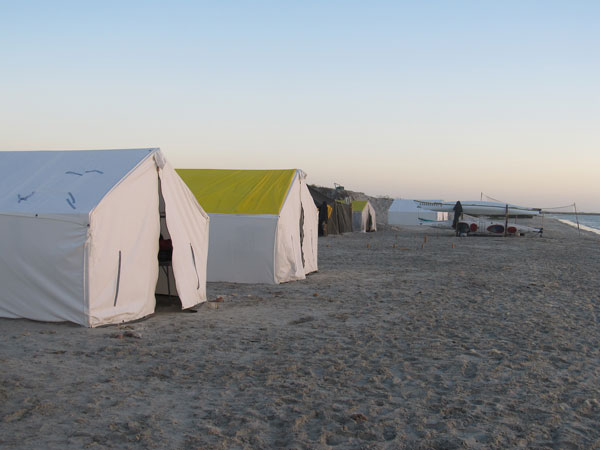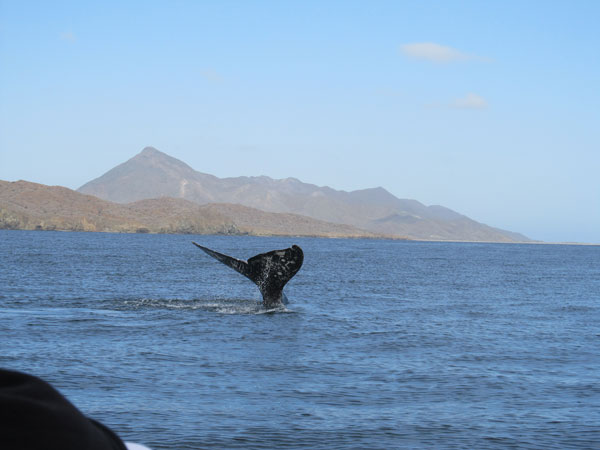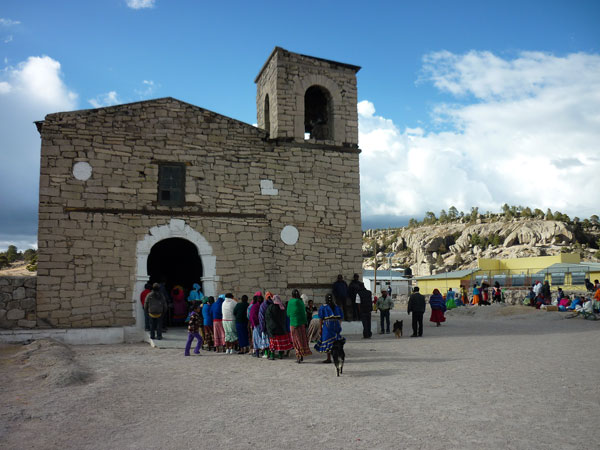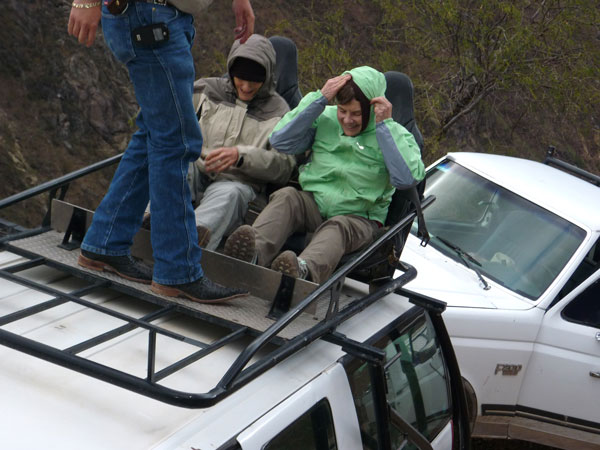Trip Leaders:
Dick and Judy Opsahl.
Author:
Dick Opsahl.
Participants:
New Mexico: Evan Rose, Felicia Orth, Ernie Newman,
Susan Newman, Lia Perry, Sherry Hardage. California: Dick Opsahl, Judy
Opsahl, Ann Nitzan, Pat Skillman. Connecticut: Charlie DeWeese,
Rhonda DeWeese.
After a light dinner, we departed El
Fuerte for the 2-hour bus ride to the actual shipping port at
Topolobampo. There was lots of security stuff and endless waiting to
board. We finally got on board about midnight. The Ferry boat was
gigantic, filled to the gills with cargo trailers. There were about
100 private cabins excellently set up for the gringos with sleeping
bunks, toilet and shower. There were several hundreds of no cabin
passengers who spent the night in fancy reclining deck chairs in a
dorm style set up. The cabin people even received a very tasty free
meal. Shortly after dawn and a glorious sunrise we made port at La
Paz on the East side of the Baja peninsula. Again lots and lots of
security and detailed baggage inspection. AK-47s all over. Our
whales and sea kayak crew were waiting for us and whisked us off as
soon as we completed security.
Our first stop for the crossing of the
Baja on the way to the Pacific was at the La Paz hotel where we
would spend the last few days after the Magdalena bay whale/kayak/
camping trip. At the hotel we were able to drop off stuff that we
would not need at the beach like lap tops. We would, of course need
our iPads with their dandy animated star and planet charts for night
sky gazing.

Our camp at
Magdalena.
The ride out was relatively
uneventful. We stopped at one dandy "hole in the wall" food place
where we got bean burritos and home made cheese. Arriving at the
beach at San Carlos was nice. We hiked around a bit waiting for the
boats which would bring back the prior campers from our camp on the
bay side of Magdalena Island. The crossing took about 30 minutes in
the high speed outboard motor boats. After the "wet" landing we 12
loaded our stuff into six 2 person tents which were permanently set
up on the sand. (no tent floors). We were quickly loaded back into
the boats for our first afternoon whale watch. The whales were ready
and waiting for us. They were all around close to the entrance
linking the bay to the Pacific Ocean. The procedure would be the
same for each whale watch. Spot a whale, get closer then cut the
motor and see what the whale or whales are doing. Then we motored
back to camp for the detailed introduction and "happy hour" with
margaritas and Pacifica beer. We all spent the next hour or so
organizing our tents, the sleeping bags and things needed for the
next few days.
Dinners were always super with a
strong disposition toward sea food. Local fresh fish, lobster,
scallops etc. Always a salad and nice desert. Coffee available 24
hrs. Breakfasts usually offered huevos rancheros and real refried
beans. Even lunch was a happening.
In general, days had a morning and
afternoon whale watch and an afternoon sea kayak option. There was
lots of instruction available for those doing the kayak so no prior
experience was needed. The kayak part was to go to the nearby tidal
mangrove forest and watch hundreds of shore and sea birds. The sea
kayaks, BTW, were the genuine thing with feet under the deck and
rudders for the rear paddler.

A nice close up of
one of the many whales that we saw.
It was an easy 20 minute hike west to
the Pacific across the dunes which we all did once or twice. There
was a nice sandy beach on the ocean side.
A big surprise was 2 evening slide
shows. They had generator power to run the digital projector. Great
shows about whales and birds. A few of us who had brought iPads were
able to recharge to aid the reading in the tent after dark and doing
the star watch.
Night skies we dramatic. Away from
most light pollution that we all have to put up with at our normal
homes. Great views of Mercury, Mars Jupiter and Venus. The northern
constellations were easy to spot. The milky way galaxy (our home)
right there.
We finally had to pack up for the trip
back to La Paz. Motor boat to hand off spot where we then loaded
into 2 vans. Back to La Paz with the regular stop at the home made
cheese place. But we now were ready and bought a large hunk for the
La Paz happy hour. We stopped again for groceries to prepare our
breakfasts . The hotel had free, fast wireless so all of our
computer guys were in 7th heaven.

Tarahumara Indians
mentioned on the first page of the report.
Arriving at the hotel, we reclaimed
our stuff and found our rooms. Dick and Judy were assigned the
incredible master suite set up for the hotel owner when she was in
residence. It was a 3 room setup with a gourmet kitchen, several
sofas and even a washer dryer. We then knew where we would cook and
eat our breakfasts and possibly a dinner. The top deck was the place
for our happy hour and view of the sunset over the Bay. It was the
final day of Mardi Gras and grand floats were parading on the main
street.
The next day we had all day to hike
around town. The anthropological museum was very good, the churches
and cathedrals worth a visit. After a very nice real Mexican lunch,
a few of us went to the downtown native market and bought enough
stuff for a real feast to celebrate our last night. Felicia Orth was
our chief chef and anxious to make use to the gourmet kitchen in the
Opsahl suite. Sherry Hardage made guacamole for hors d’oeuvres, and
Judy made dessert. It was a grand meal highlighted by very fresh red
snapper, roasted stuffed poblanos, fresh corn, as well as the
guacamole and fruit dessert. We all agreed that this was the best
meal of the entire trip.

The top of our van
extended our seating capacity nicely.
Departure the next morning was at
about the same time for 7 of us. Easy van trip got us to the
airport, the inevitable security, then waiting for the flight in a
pleasant setting with free WiFi. Four take offs and landings later
and a drive from the airport, the Opsahl's and two fellow Sequoias
residents, Pat and Ann, were back home at the Sequoias, Portola
Valley by about 2 AM.
back to page 1